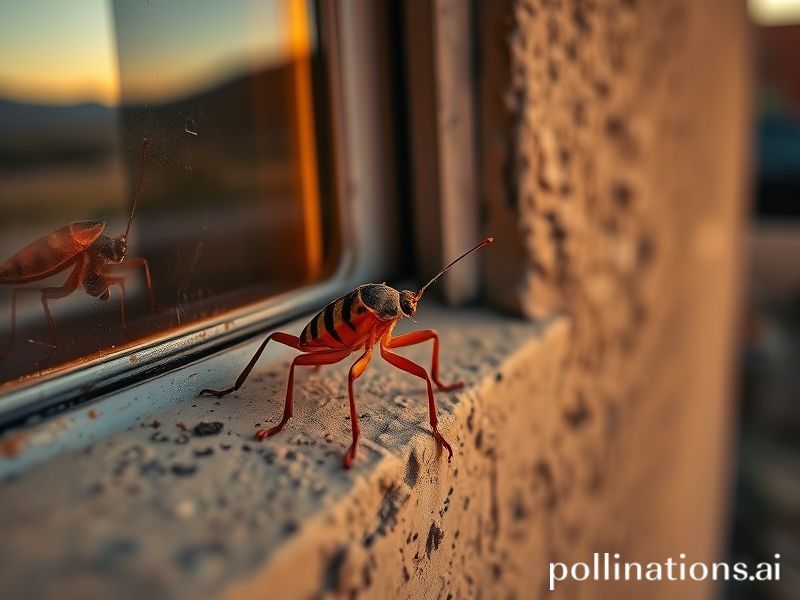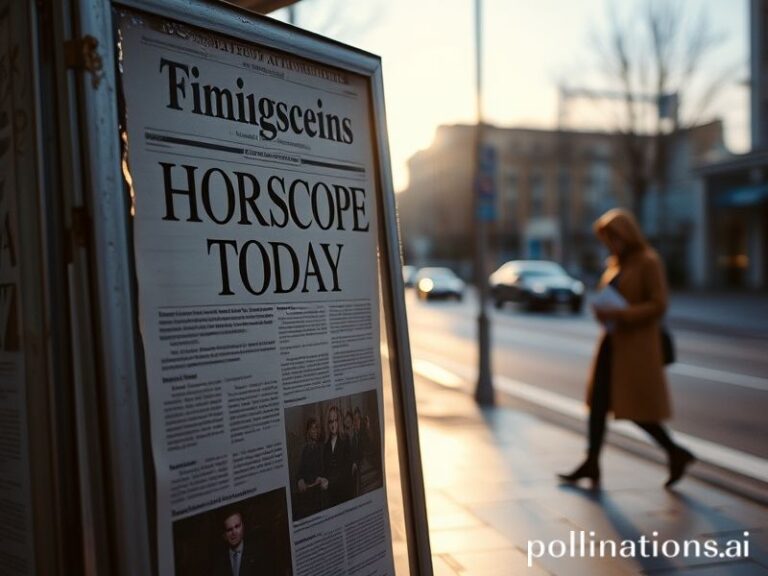Global Love Bite: How California’s New Kissing Bug Is Just Late to the World’s Parasitic Party
The Kiss of Death, Californian Edition
By Diego Valdez, Dave’s Locker Correspondent in Exile
California, that sun-kissed land where avocados cost more than rent in Lisbon, has a new nightlife sensation: the “kissing bug.” Triatoma protracta—sounds like a Bond villain from Mérida—has decided that Los Angeles real estate is suddenly undervalued and is moving in. Locals, busy arguing over oat-milk versus almond-milk carbon footprints, are only now noticing the insect version of a Tinder date that slips you Chagas disease instead of chlamydia.
From the perspective of someone who has filed copy while trapped in a Bogotá quarantine, a Lagos lockdown, and a Parisian heatwave with no functioning AC, watching Californians discover a vector-borne parasite is like watching Silicon Valley discover that water is wet. The rest of the planet has been cohabitating with Triatoma for centuries; in Bolivia, mothers swat them away like Parisians flick cigarette ash. But the moment the bug crosses the Tijuana-San Diego checkpoint without a visa, it becomes a “crisis.” CNN deploys holograms, Goop sells $125 anti-kissing-bug chakra stones, and Gavin Newsom holds a press conference flanked by two dozen flags—because nothing fights an insect like vexillology.
Globally, Chagas kills roughly ten thousand people a year, mostly in Latin America where “pre-existing conditions” include being poor and brown. The WHO lists it as a neglected tropical disease, which is bureaucrat-speak for “doesn’t affect people who buy NFTs.” California’s infestation won’t tilt that mortality meter; instead, it tilts the vanity mirror. Wealthy Angelinos who once flew to Costa Rica to find themselves now find protozoan stowaways in their reclaimed-wood guesthouses. The irony is thicker than a Beverly Hills smoothie: a disease of poverty touring Bel Air.
International implications? Big Pharma smells profit. Japanese conglomerates are already patenting synthetic triatomine pheromones; Swiss labs are engineering CRISPR mosquitoes to seduce and assassinate their assassin bug cousins. Meanwhile, Argentine researchers—who have been begging for funding since the Peróns—watch their grant applications languish. The global South remains the R&D petri dish, the North the market. Same colonial perfume, new bottle.
Broader significance lies in climate change’s twisted travel itinerary. Warmer nights let kissing bugs vacation farther north, same as European retirees in Alicante. The Mediterranean now has its own Triatoma species; Greece had an outbreak last summer, right when influencers were busy hashtagging #SantoriniSunset. Climate migration isn’t just for humans; parasites have LinkedIn profiles too.
Human nature, predictably, oscillates between denial and boutique panic. Californians will probably respond the way they respond to wildfires: Instagram the apocalypse, then crowdsource a GoFundMe for the firefighter’s therapy dog. Expect artisanal insecticide pop-ups in Silver Lake, curated by a guy named Jasper who swears neem oil cured his trust issues. Somewhere in Oaxaca, a grandmother will roll her eyes so hard the earth shifts another millimeter along the San Andreas.
Yet there is a darker punchline. Chagas is treatable if caught early, but try telling that to a gig-economy workforce without health insurance. The bugs don’t discriminate; the healthcare system does. So while tech bros sequence their gut microbiomes, the farmworkers who pick their kale sleep in bug-ridden trailers. One kiss, thirty years later, heart failure. The American dream, cardiomyopathy included.
Conclusion? The kissing bug’s California debut is less an invasion than a mirror. It reflects a planet where disease vectors follow capital flows, where solutions are monetized before they’re understood, and where the privileged discover global problems via push notification. If you want genuine protection, forget $300 bug zappers: try solidarity, equitable healthcare, and maybe a tax on second homes. But good luck getting that through the state legislature—those lobbyists bite harder than any insect.







